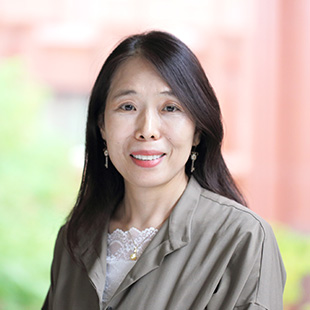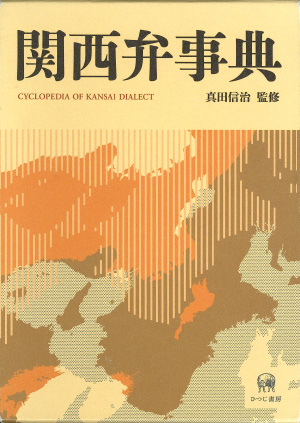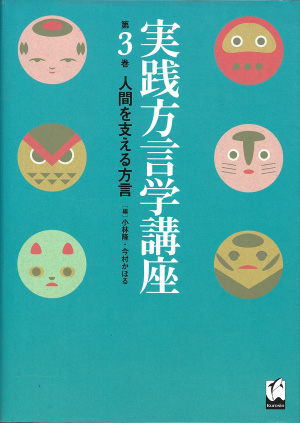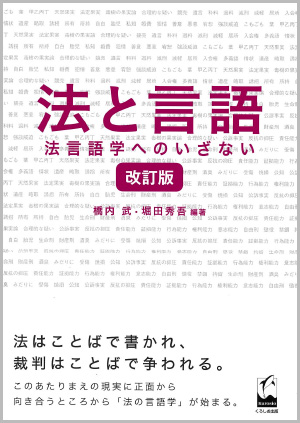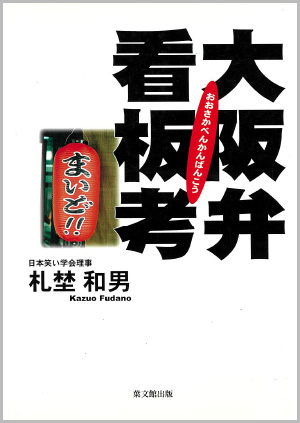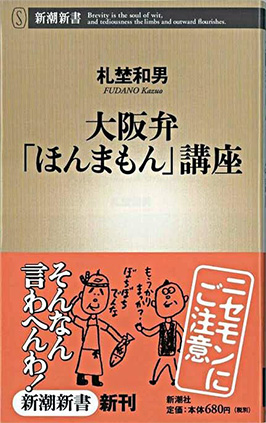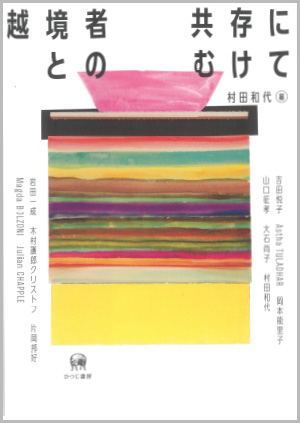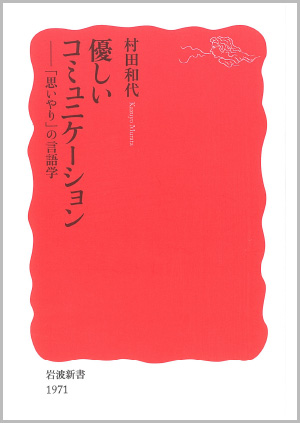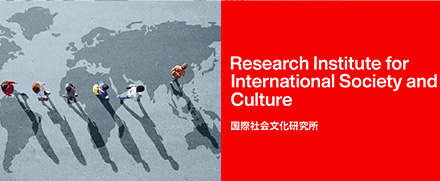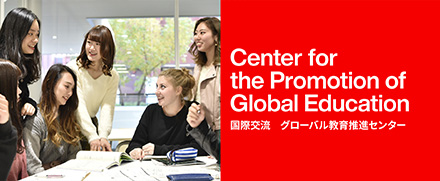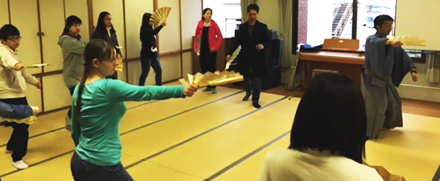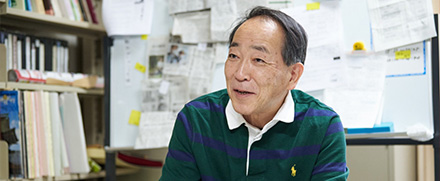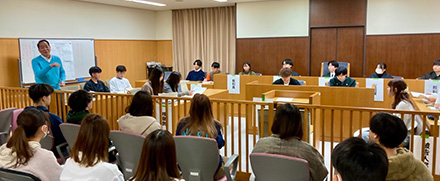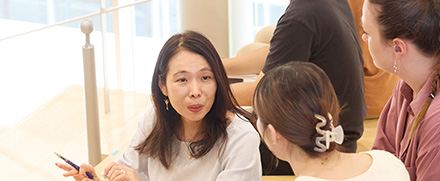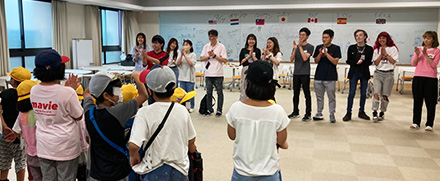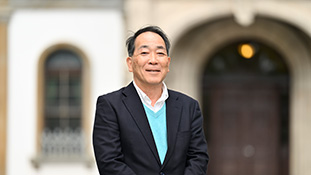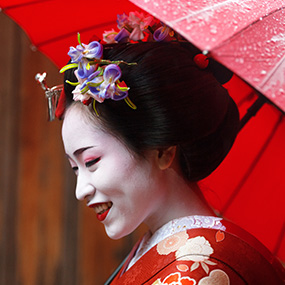Supervision Fudano Kazuo / Associate Professor, Faculty of Letters, Ryukoku University
The Boundary Between Language and Dialect
First of all, what is the difference between “dialect” and “language”? According to Associate Professor Kazuo Fudano, author of Dialects in the Courtroom (Izumi Shoin) and Osaka dialect “Honmamon” Course (Shinchosha) among others, “A language is a collection of words that are culturally and historically independent, and its lower-level variant is said to be a dialect.”
However, whether a language is “independent” or not depends on the political situation of the time and people’s aspirations, and there is no absolute definition. “For example, people in Kyoto sometimes refer to their language as ‘Kyoto language’ rather than ‘Kyoto dialect.’ I feel that this expresses the city’s pride as a capital for 1,200 years.”
One of the symbolic cases concerning the identity of language is the 1972 “Uchinaguchi Trial.” Just before Okinawa was returned to Japan, three young Okinawan men were arrested in the 1971 National Diet (House of Representatives main session) for shouting “Crush the Okinawa Reversion Agreement!” and setting off firecrackers and distributing leaflets. When the defendants spoke in the Okinawan language, Uchinaguchi, in court, the judge ordered them to speak in Japanese, and the young men shouted, “Uchinaya, Nihon Yagaya? (Isn’t Okinawa Japan?)” in objection. The three Okinawan men continued to use Uchinaguchi and were ordered to leave the court. “This is a case that raises questions about what makes the difference between a language and a dialect, and about the relationship between language and politics.”
Dialects Have Become Popular Since the 1980s
“The way dialects are treated changed dramatically in the 1980s,” says Associate Professor Fudano. “Under the previous curriculum guidelines, dialects were subject to correction. However, circumstances have now changed to affirming the value of dialects. As I wrote in my book Thoughts on Osaka Dialect Signboards (Yobunkan Publishing), it was in the 1980s that words in the Kansai dialect such as ‘maido’ began to be used frequently on signboards and in store names.”
Eventually, this progressed into “dialect cosplay,” with students in the Tokyo metropolitan area using the Kansai dialect to get a laugh. From the 1990s onwards dialects, which had been the subject of an inferiority complex, began to be viewed positively as tools for creating character and familiarity (*1).
“The 1980s, which marked the beginning of the change, is considered a time when people’s values altered significantly. From the metropolitan area to the countryside, from growth to stability, from hardware to software. Amidst this trend, I think the reassessment of regional identity is behind the rise in the status of dialects.”
*1 Tanaka, Yukari. The Era of Dialect Cosplay: From Fake Kansai Dialect to Ryoma Dialect. Iwanami Shoten, 2011.
Kansai Dialect Is One of Japan’s Most “Popular” Dialects
One of the dialects that has a large presence in Japan is the Kansai dialect. According to Associate Professor Fudano, the Kansai dialect, especially the native Osaka dialect, is a “peaceful (principled) language that equalizes relationships with others.” There are three reasons that support this underlying statement. The first is because “it is a language that ‘shortens the distance between you and the other person.’ It is effective at bringing individuals closer together, such as by adding ‘nen’ to the end of their words to show that they are willing to open up their feelings (*2), and by addressing others as ‘jibun (myself)’ in the first person.
“The second reason is laughter. The Osaka phrase ‘summer clam’ refers to browsers who just look at a product but don’t buy it. It’s a play on words that involves the word for clam that goes, ‘Just looking and not buying.’ It’s now an obsolete word. There are many more, such as ‘bonyari (absentmindedly)’ from ‘Hachigatsu no yari (August spear)’ derived from the Obon Festival in August. Humor is incorporated even when bad-mouthing or grumbling.
“The last reason is to prevent an altercation. When you don’t want to listen, cover your ears and say, ‘Kyou mimi nicchou (My ears are on Sunday).’ Instead of saying ‘souji senkai! (go and clean up!),’ you can convey the message in a softer way by just adding ‘na’ such as ‘souji senkaina (go on and clean).’ A merchant once shared with me his words of wisdom. Even if you don’t have the requested product, don’t say ‘arimasen’ (‘I don’t have it’ in standard dialect) definitively, but rather ‘omahennaa’ (‘I don’t have it’ in Kansai dialect). I’ll lose big if I make the customer angry.”(*3).
The natural ability to draw others into your field may be related to the fact that Osaka is known as the “city of business.” Hirakata Park, an amusement park in Hirakata City in Osaka, achieved great success by harnessing the power of dialect. The strategy was to have a popular actor speak a phrase, one that isn’t exactly used anymore, in the Osaka dialect: “Hirapaa de Oma!” This turned out to be a success. The dialect strategy using “Oma!” is said to have helped spread the name of the amusement park across the country and resulted in the number of annual passport members exceeding 1 million. “This anecdote proves the selling power of the Kansai dialect, doesn’t it?” (*4)
The power to motivate people is also being demonstrated in areas other than economics. One example is a recruitment poster for the Osaka Prefectural Police. With a police car in the background, a large message reads, “I’m here to get you.” Next to a crying child are the words “If an apology alone is a resolution, we don’t need the police!” Associate Professor Fudano is impressed by this mastery of the Kansai dialect in the poster, saying, “The gap between the words and the image of a rigid police force makes it work. It’s simply splendid.” (*5)
*2 Onoue, Keisuke. Osaka Language Studies. Sogensha, 2010.
*3 Fudano, Kazuo. “Business Negotiations and Kansai Dialect.” (Kansai Dictionary, Supervised by Shinji Sanada, Hitsuji Shobo, 2018.
*4 Fudano, Kazuo. “‘Oma!’ — Popular Actors and Dialects.” Economy and Society of Regional Languages — Dialect Souvenirs/Goods and Their Surroundings, no. 339, 2015, Language Economics Research Group, Sanseido.)
*5 Fudano, Kazuo. “Research on Laughter in the Osaka Prefectural Police — Focusing on the Language Landscape (Poster)” (Research presentation at the 29th Annual Conference of the Japanese Laughter Society in 2022)
Dialects Can Be Tools to Emotionally Destroy if Misused
However, the power to appeal deeply to the heart can sometimes become a deadly weapon. Associate Professor Fudano, who works at Ryukoku University’s Criminology Research Center and focuses on research on dialects and false accusations, is particularly alarmed by the use of the Kansai dialect during interrogations. He points out that through the use of the Kansai dialect, there is a danger that the police might force people to confess. The Kosan Incident (1974–1999) resulted in an acquittal after a 25-year battle. Etsuko Yamada, a victim of a false accusation, told Associate Professor Fudano, “At first, during the interrogation, the language was a little off-handed, but when we got to know each other, they spoke in Kansai dialect.” Eventually, the dialect turns into violent words that drive people into a corner. The defendant also tries to match the language. The Kansai dialect is used when making someone take the fall. “False confessions and false accusations are born from exchanges in dialect,” she said, and she revealed that during the interrogation, speaking in the Kansai dialect was the trigger for the false confession. “In a place where the truth should be ascertained, the Kansai dialect was used as a means to forcefully extract the answers sought. Dialects are a double-edged sword that can be good or bad depending on how you use them.”
Dialect Rights to Protect Identity
Language and the mind, as well as language and identity, are closely connected.
“Forcing a dialect speaker to use standard language is like asking a left-handed person to use right-handed scissors. There are feelings and sensations that can only be expressed in dialects. For example, as an Osaka native, I call the feeling on my skin when I’m horrified ‘sabuibo.’ This feeling cannot be expressed by ‘torihada’ (‘goosebumps’). In the Uchinaguchi trial, the judge ordered the defendants to ‘use language that everyone can understand.’ However, the reason why Tokyo’s language became a standard that ‘everyone can understand’ was simply because it happened to be used in a place that became a political base, and there are no merits to the language itself. My mentor Shinji Sanada (Professor Emeritus at Osaka University) taught me, “There is not just one standard. You can have as many as you want.” This is deeply etched in my heart. Since there are people who can only speak in dialects and certain expressions can only be expressed in dialects, individuals have the right to speak in dialects, even in public spaces, without being hindered by anyone. Therefore, I think that dialect rights exist.” (*6)
“It seems like plausible logic that we should speak in a language that everyone can understand, but is that logic really universal?” Professor Fudano has his doubts.
“I think there is a great meaning in speaking in one’s own dialect, in the sense of contrasting one’s life, lifestyle, and individuality with authority. Yasuyuki Tokuda, the lawyer who was in charge of the national compensation lawsuit for Hansen’s disease, spoke about how the victim’s messages were not delivered clearly when they tried to answer in standard Japanese regarding the damages to which they were exposed through discrimination and prejudice for many years, but the words were so rich when spoken in the Kansai dialect that they touched the hearts of those who listened. (*7) Dialects serve as a basis for protecting one’s own important identity, and they also serve as a stronghold for protecting human rights. That’s what I’ve gathered.”
*6 Fudano, K. (2017). Dialects in court. Izumi Shoin., Requirements related to language and education for criminal justice (“Questions for criminal justice”) (M. Ibusuki, Ed.). Iwanami Shoten.
*7 Fudano, Kazuo. “Dialect Issues in Judiciary and Administration.” Practical Dialectology, vol. 3, edited by Takashi Kobayashi et al., Kuroshio Publishing, 2020.






